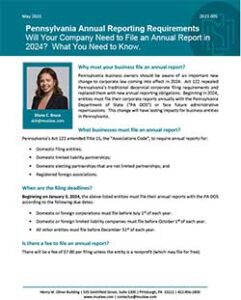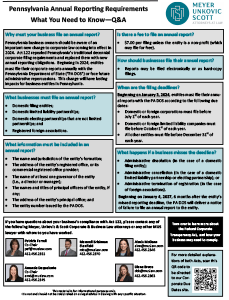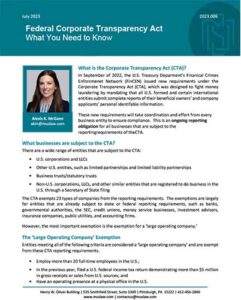New Pennsylvania Annual Reporting Requirements Begin January 3, 2024
New Federal Corproate Transparency Requirements Begin January 1, 2024
Act 122 repealed Pennsylvania’s traditional decennial corporate filing requirements and replaced them with new annual reporting obligations. Beginning in 2024, entities must file their corporate reports annually with the Pennsylvania Department of State (“PA DOS”) or face future administrative repercussions. This change will have lasting impacts for business entities in Pennsylvania.
Below are answers to some frequently asked questions about this change.
- Domestic filing entities;
- Domestic limited liability partnerships;
- Domestic electing partnerships that are not limited partnerships; and
- Registered foreign associations.
- The name and jurisdiction of the entity’s formation;
- The address of the entity’s registered office or its commercial registered office provider;
- The name of at least one governor of the entity (i.e., a director or manager);
- The names and titles of principal officers of the entity, if any;
- The address of the entity’s principal office; and
- The entity number issued by the PA Department of State.
$7.00 per filing unless the entity is a nonprofit (which may file for free).
Reports may be filed electronically or as hard-copy filings.
Effective January 3, 2024, the above-listed entities must file their annual reports with the PA DOS according to he following due dates:
- Domestic or foreign corporations must file before July 1st of each year.
- Domestic or foreign limited liability companies must file before October 1st of each year.
- All other entities must file before December 31st of each year.
- Administrative dissolution (in the case of a domestic filing entity);
- Administrative cancellation (in the case of a domestic limited liability partnership or electing partnership); or
- Administrative termination of registration (in the case of foreign associations).
Beginning on January 4, 2027, 6 months after the entity’s missed reporting deadline, the PA Department of State will deliver a notice of failure to file an annual report to the entity.
In September of 2022, the U.S. Treasury Department’s Financial Crimes Enforcement Network (FinCEN) issued new requirements under the Corporate Transparency Act (CTA), which was designed to fight money laundering by mandating that all U.S. formed and certain international entities submit complete reports of their beneficial owners’ and company applicants’ personal identifiable information.
Below are answers to some frequently asked questions about this change.
Important Update: On November 29, 2023, FinCEN issued a final rule extending the deadline for entities created or registered in 2024 from 30 days to 90 days. This does not apply to entities created in 2025 and beyond.
- U.S. corporations and LLCs,
- Other U.S. entities such as limited partnerships, limited liability limited partnerships,
- Business trusts/statutory trusts,
- Non-U.S. corporations, LLCs, and other similar entities that are registered to do business in the U.S. through a Secretary of State filing.
The CTA exempts 23 types of companies from the reporting requirements. The exemptions are largely for entities that are already subject to state or federal reporting requirements, such as banks, governmental authorities, the SEC, credit unions, money service businesses, investment advisors, insurance companies, public utilities, and accounting firms.
- Entity name, including any alternatives to the trade name or the d/b/a names;
- Company’s physical street address;
- Jurisdiction in which the company filed its formation documents;
- Foreign entities must report on the state or tribal jurisdiction of their business
registration; and
- Foreign entities must report on the state or tribal jurisdiction of their business
- The business’ TIN, EIN, LEI, etc. It must be a unique identification number.
- Full legal name, which must match an ID or passport;
- Date of birth;
- Current residential address (beneficial owners) / business street address (company applicants); and
- A unique identifying number, which include state-issued IDs or passports, and images of those documents.
Filing must be done via a web portal at fincen.gov. Please contact any Meyer, Unkovic & Scott attorneys with whom you have worked to prepare to discuss and determine appropriate steps with respect to filing.
On November 29, 2023, FinCEN issued a final rule extending the deadline for entities created or registered in 2024 from 30 days to 90 days. This does not apply to entities created in 2025 and beyond.
The reporting requirements will be phased-in in three stages:
- Reporting companies created prior to January 1, 2024, must meet the reporting requirements by December 31, 2024.
- Reporting companies created on or after January 1, 2024 through December 31, 2024 must meet the reporting requirements within 90 days of registering as a business entity.
- Reporting companies created on or after January 1, 2025 must meet the reporting requirements within 30 days of registering as a business entity.
Fraud alert for businesses: Be alert for fraudulent FinCEN email requesting CTA reporting information
The U.S. Department of the Treasury’s Financial Crimes Enforcement Network (FinCEN) has been notified of recent fraudulent attempts by hackers to solicit information from individuals and entities who may be subject to reporting requirements under the Corporate Transparency Act.
The FinCEN alert says to beware of e-mail and/or letter correspondence titled “Important Compliance Notice” and asks the recipient to click on a URL or scan a QR code; these e-mails and/or letters are fraudulent. Please do not respond to these fraudulent letters or email messages. Do not click on any links in the email or scan any QR codes.
FinCEN does not send unsolicited requests.
In these brief guides, we break down what you need to know about the new Pennsylvania Annual Reporting Requirements as well as the Corporate Transparency Act. Please fill out the form below if you would like assistance with these new requirements, or reach out to any member of our Corporate Law Practice Group or with any Meyer, Unkovic & Scott attorney with whom you have previously worked.
Let Meyer, Unkovic & Scott help you
Your team
Patricia E. Farrell
Patricia E. Farrell serves as Co-Chair of the Corporate & Business Law practice group at Meyer, Unkovic & Scott. With a primary practice focus in business services, she regularly represents privately held business in mergers, acquisitions, divestitures, and other major transactions both in the United States and internationally. In addition, Patricia has a broad corporate practice where, in addition to counseling clients on business transactions, she assists with corporate governance, and emerging entity issues, as well as succession planning for business owners and a variety of other day-to-day business issues. Patricia also has substantial experience in commercial real estate transactions where she regularly represents building owners, and venture partners in structuring real estate transactions. Patricia writes and speaks regularly on matters of significance in her areas of expertise.
Amanda M. Daquelente
Amanda M. Daquelente serves as Co-Chair of the firm’s Corporate Practice Group, and a is member of the Real Estate & Lending Practice Group. Amanda’s practice focuses primarily on a wide range of business and corporate transactions, where she regularly counsels and represents clients both in general and sophisticated business transactions, mergers and acquisitions, divestitures, reorganizations, and other major transactions both in the United States, Europe, and Asia. Additionally, Amanda’s corporate practice consists of advising clients on a variety of corporate issues, including, but not limited to, entity formation, corporate governance, business succession planning and other day-to-day business and corporate matters. Amanda has a great breadth of experience representing business owners in complex business succession transactions, including sales to employee stock ownership plans (ESOPS) and trusts where she works collaboratively with ERISA counsel and trustee counsel on behalf of selling business owners. Additionally, Amanda also has experience representing companies acquiring ESOPS.
Maxwell Briskman Stanfield
Maxwell is a transactional attorney with over a decade of experience. He is a creative problem solver who implements an interdisciplinary approach to help clients achieve their goals. Maxwell’s practice is concentrated primarily in four areas – entertainment and media law; corporate and business law; mergers and acquisitions; and commercial real estate. He often represents privately held businesses in mergers, acquisitions, divestitures, and other major transactions. In addition, he has a broad corporate and business practice where he provides legal and business counselling for clients who want to start, manage, transfer, or exit a business or who may need LLCs, corporations, partnerships and related contracts and agreements to help them do so. This frequently includes contract drafting and interpretation; corporate governance, regulation, and compliance; review, negotiation, and documentation of financing arrangements; drafting opinion letters; and various nonprofit organization matters. Maxwell also has experience in commercial real estate transactions where he represents clients with real estate acquisitions, sales, leasing, and licensing.
Alexis K. McGann
Alexis K. McGann is an Associate in the firm’s Corporate, Real Estate & Lending, and Private Clients Practice Groups.
Alexis focuses her practice counseling clients on corporate mergers and acquisitions, business planning and structuring, real estate acquisitions and dispositions, commercial leasing, and dealing with a multitude of general corporate governance matters.
Diana C. Bruce
Diana C. Bruce is an Associate in the firm’s Corporate & Business Law and Real Estate & Lending Practice Groups.
Diana practices in a broad array of corporate, business, and commercial real estate transactions, including business entity formation, entity structure, and commercial leasing. She has also assisted clients in the administration of estates and associated matters. As a former member of the firm’s Litigation & Dispute Resolution Practice Group, she has additional experience drafting pleadings, presenting motions, and negotiating settlements in a wide variety of matters including breach of contract and collections.







